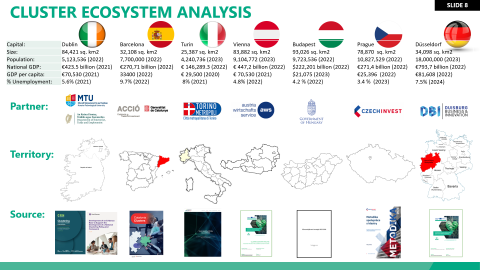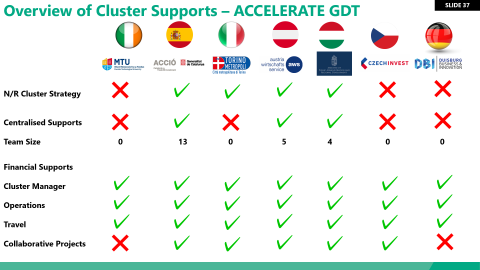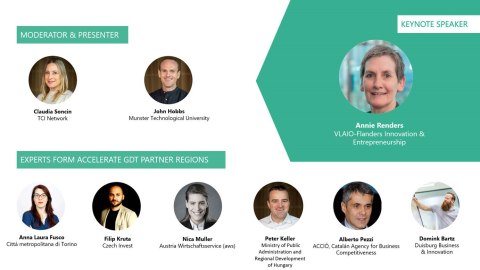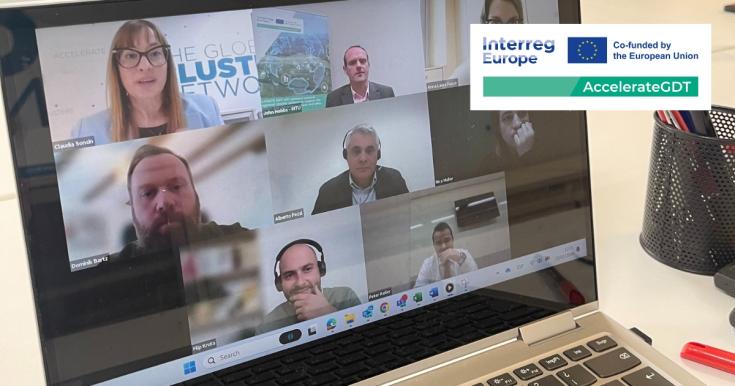Webinar: Comparing Cluster Policies Across the EU
Over 60 attendees from all across the globe, logged into the Accelerate GDT webinar ‘A Sustainability Journey into Cluster Policies in the EU,’ which compared and contrasted 7 European Cluster Ecosystems on the 28th of February 2024.
The research which underpinned this webinar was a series of case studies completed as part of the Accelerate GDT project to understand our partner regions' ecosystems and support policies for clusters. The purpose was to provide a baseline – for partners to be able to understand each other’s cluster policy programmes and initiatives, to then be better able to co-learn and integrate sustainable and digital transition supports into these enterprise policies for industry support.
The webinar started with a short introduction to the Accelerate GDT Project by our moderator, Claudia Soncin, Project Manager Global, TCI Network. Claudia outlined the agenda for the day and projects aims and implementation plan. She handed the floor to invited keynote speaker, Annie Renders, Head of Unit Cluster Policy, VLAIO, Government of Flanders. Annie provided an excellent overview of the Cluster programme which supports two different types of clusters in Flanders (1) Spearhead clusters and (2) Innovative business networks, and described the associated supports and policy which underpin these initiatives.
This led us to an intervention from John Hobbs, Senior Lecturer, Munster Technological University who provided a summary and comparison of the 7 partner regions Cluster Ecosystem Analysis. This presentation outlined the strategic national/regional policy context for Accelerate GDT partner regions in Ireland, Catalonia, Piedmont, Austria, Hungary, Czech Republic and North Rhine-Westphalia. The presentation focused on an overview of the clustering ecosystem and the various state/regional supports for cluster programmes provided – including finance, aims, centralised supports & KPIs.

It was interesting to see the difference in dedicated cluster policies across the partner regions of Accelerate GDT, with 4 regions having a dedicated Cluster Policy, whilst the three other partners provide clustering supports through other innovation and industrial support policies. Similarly, the mechanism of financing clusters across partner regions is different; all regions have financial support for management resources, operations and travel but to varying degrees (match funding requirement with between 30% and 100% required). Five out of the 7 partner regions provide funding for collaborative projects among 3 or more companies. This type of innovation funding can be transformative as it connects companies, allowing them to build trust and expand their operations and value chains – growing their competencies and product and service portfolio.
At the end of his presentation, John Hobbs took the opportunity to share with the audience the service offering and key resources provided by the Interreg Europe PLP and how they can support EU policy makers and clusters across Europe through their expert advice, knowledge dissemination, access to good practices and policy learning on clustering and competitiveness.

After the summary of the 7 partner region’s Cluster Ecosystem Analysis, we were joined by experts from each partner regions these included John Hobbs, Munster Technological University; Alberto Pezzi, ACCIÓ, Catalan Agency for Business Competitiveness; Anna Laura Fusco, Città Metropolitana di Torino; Nica Muller, Austria Wirtschaftsservice (aws); Peter Keller, Ministry of Public Administration and Regional Development of Hungary; Filip Kruta, Czech Invest and Dominik Bartz, Duisburg Business & Innovation for a Panel Discussion with a Q&A session.

Claudia Soncin, TCI Network, was delighted with the overall impact of the webinar, “I guess the key message which resonates from the webinar is that there are a range of differing Supports for cluster development across Europe, and whilst differing approaches can have success in certain regions that does not imply success in others. Our shared learning journey via Accelerate GDT will allow our partner regions to make small incremental changes to improve the impact of their programme and Policies over time.”
To access resources from our webinar – click the links below:
- Recording of Sustainability Journey into Cluster Policies in the EU Webinar – Click Here
- Accelerate GDT Slide deck shared during the webinar – Click Here
- Case Study Analysis Ireland – Click Here
- Case Study Analysis Catalonia – Click Here
- Case Study Analysis Piedmont – Click Here
- Case Study Analysis Austria – Click Here
- Case Study Analysis Hungary – Click Here
- Case Study Analysis Czech Republic – Click Here
- Case Study Analysis North Rhine-Westphalia – Click Here
- Interreg Europe PLP Cluster Project and Resources Information – Click Here

